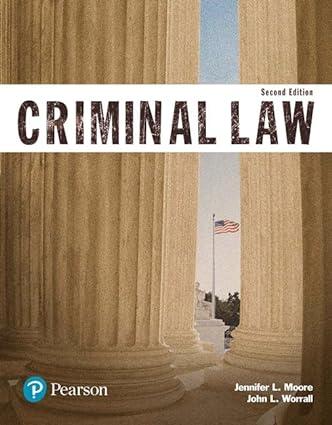Monroe stole a gas stove from his apartment when he moved out. Gas seeping from the stoves
Question:
Monroe stole a gas stove from his apartment when he moved out. Gas seeping from the stove’s unstopped gas line caused an explosion the next morning, extensively damaging the apartment building and injuring two people. Monroe described his actions on the night he stole the stove. He shut off the gas at the valve and disconnected the flexhose while an accomplice bled gas out of the burners. When Monroe attempted to install the stove in his new apartment, he realized he needed a fitting for the shutoff valve. He and his accomplice returned to the old apartment to remove the fitting. When he tried to remove the fitting, the whole shutoff valve twisted off. Monroe took the entire valve. Monroe’s accomplice soon felt lightheaded. Monroe told the Bureau of Alcohol, Tobacco and Firearms Special Agent: “I’ve worked with natural gas before and I know that it is very explosive but I did not think it would build up like it did. I thought I could leave the door open about an inch and it would ventilate enough to keep anything from happening. I didn’t intend for anyone to get hurt.”
. . . The government prosecuted Monroe under 18 U.S.C. § 844(i) for “maliciously damag[ing] or destroy[ing] . . . means of fire or an explosive, any building . . . used in interstate or foreign commerce or in any activity affecting interstate or foreign commerce. . . . Monroe stipulated to everything except “maliciously.” The jury convicted him, and he appeals. Monroe contends that the plain meaning, legislative history, federal case law, and the common law of arson all require that a defendant intentionally cause an explosion or fire to be convicted under § 844(i). However, “maliciously” for purposes of § 844(i) means “acting ‘intentionally or with willful disregard of the likelihood that damage or injury would result.’” Intent is sufficient but not necessary for a conviction under § 844(i).
Monroe [also] contends that the evidence is insufficient to prove he intended to start a fire. . . The evidence is sufficient if Monroe “acted in willful disregard of the likelihood” of damaging the apartment building. Monroe admitted he had worked with natural gas before. In addition, Monroe asked in advance about plugging the gas line, indicating awareness of the dangers associated with leaking gas. Monroe removed the entire shutoff valve. Shortly thereafter, his accomplice became lightheaded, indicating that gas was leaking.
Monroe made no attempt to plug the leak, although a plug would have cost only about $2. Monroe contends that he believed leaving the door ajar would adequately ventilate the apartment; that he lived with a leaking gas line that never exploded; and that he is borderline mentally handicapped. Viewing the evidence and the inferences therefrom in the light most favourable to the government, a rational juror could have found that the evidence established beyond a reasonable doubt that Monroe acted with a willful disregard of the likelihood of damage.
. . .The jury instructions defined maliciously as “intentionally or with willful disregard of the likelihood that damage would result from his acts.” Monroe challenges the district court’s failure to instruct the jury that malice required: (1) the intent to start a fire; (2) more than negligence; (3) more than recklessness; (4) a near certainty that the building would be damaged; (5) an evil intent; and (6) proof that the fire was not an accident.
. . . The judge did not commit reversible error by refusing to give Monroe’s requested instructions. First, Monroe’s requested instructions that malice required intent to start the fire, near certainty that the building would be damaged, evil intent, and proof that the fire was not an accident do not correctly state the law. Second, the district judge’s definition of “maliciously” as “with willful disregard of the likelihood that damage would result” substantially covered Monroe’s requested instructions that malice requires more than negligence or recklessness . . . AFFIRMED.
Questions:
1. What is the defendant’s legal argument regarding his arson conviction?
2. Do you agree with the court’s decision in this case? Why or why not?
Step by Step Answer:






